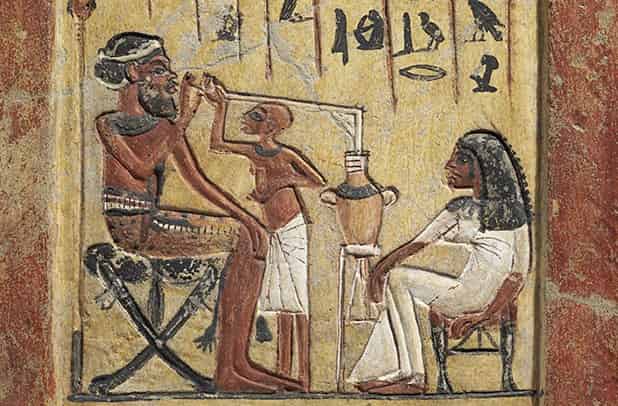Welcome to ARCHY 369:
Archaeology of Alcohol and Drugs
Autumn 2021; Tuesday/Thursday 10:30-12:20
Burke Museum - East Classroom
Peter Lape

Representation of a Syrian mercenary drinking Egyptian beer through a long rod, one of the typical filter rods for drinking beer
What is this class about?
People are frequent users of psychoactive drugs, including alcohol, tobacco, marijuana, and many, many others. Nearly 90% of American adults have used these substances at least once, and 60% report use in the past month. Tobacco and marijuana are major cash crops in the US. While many people use these substances with minimal health effects, millions of people suffer from addiction, and drug use (especially tobacco) is the leading cause of preventable death in the US. Clearly, psychoactive drugs are important to contemporary human culture.
So, where did these drugs originate? How widely used were they in the past? How was drug production, distribution and use tied to money, politics and religion? Are there culturally specific ways of being drunk? How do you make alcohol? How do you study drug trade when it is often illegal?
We’ll try to answer these and many other questions in this new course. We’ll use archaeological evidence supplemented with other forms of cultural knowledge. Our class will meet in the Burke Museum and frequently utilize belongings stored there. We’ll look to the globe for answers but when possible, use the Pacific Northwest and Seattle city for local stories.
What will you learn in this class?
- the deep history of psychoactive drugs in human culture
- how to use archaeological evidence and an anthropological perspective
- how to be a bootlegger
Meet Peter Lape, your instructor:
I am an archaeologist and museum curator. My research has often taken me to Island Southeast Asia where I have studied the origins of the trade in spices like nutmeg, which were used as psychoactive drugs as well as flavorings and medicines. During a field survey years ago on a small island in Indonesia, I first stumbled on a homemade still, where a group of men was producing sopi, a distilled palm sap or coconut juice liquor. Since then, I have been fascinated with alcohol production and use in this region and beyond. I’m excited to explore these topics with you this quarter.
Where does the class meet?
We will meet in the East Classroom at the fabulous new Burke Museum. To get there, enter the main public entry door next to Off the Rez Cafe. Go down the main stairs to the left of the store and admissions desk (no need to check in) under the whale skeleton. The East Classroom is behind the stairs.
What are the assignments and how are grades calculated?
Here is how we will figure out what grade to give you at the end of the quarter:
Reading responses and class discussion participation (each class meeting): 25%
Paper #1-Alcohol drinking observations (due 10/18): 25%
Paper #2-Smoking/vaping observations (due 11/9): 25%
Final Project-tba (due 12/6): 25%
Notes: There may be changes to the syllabus over the course of the quarter to allow for guest speakers and inclusion of any newly published research, so check this Canvas site frequently. There may be extra credit opportunities over the quarter, watch for announcements.
How to contact the instructor outside of class meeting times:
Feel free to use the Canvas message system or email (plape@uw.edu). Please start your message with a polite greeting and use a helpful subject heading. Also, please be nice, spell things correctly, and use complete sentences. I will answer your message as soon as I can within normal business hours.
I will hold weekly office hours on Zoom (Thursdays 2:30-3 pm). Feel free to drop in anytime (there is a waiting room to allow one student at a time). You can also try to catch me before or after class. If none of those options work for you, message me to set up an appointment.
What are the rules and policies?
- Face coverings (masks) are required for entry to the Burke Museum (and all UW buildings) regardless of vaccination status. Students not wearing masks will not be allowed to enter the building.
- If you are feeling ill, do not come to class. Get in touch with me and we'll figure out ways you can keep up with the class
- Late submissions will not be accepted unless you make alternate arrangements prior to the due date. Get those assignments in on time or accept the consequences.
- I welcome ongoing feedback about the class. Please feel free to send suggestions for improvement at any time during the quarter.
- You are expected to produce your own work in this class. Plagiarism or any other form of cheating will not be tolerated. There won't really be any good opportunities to cheat, actually. All students are expected to uphold the University of Washington standard of student conduct.
- We are committed to meeting the needs of all class participants. The Disabled Student Services (DSS) Office coordinates academic accommodations for enrolled students, University staff, and academic personnel with documented disabilities. We are happy to discuss ways of expanding access to this class that are not only mandated by law.
- College can be a difficult time, especially during a global pandemic. The UW has comprehensive Counseling and Mental Health Services, including individual and group counseling as well as 24/7 counseling and crisis support through My SSP.
- Washington state law requires that UW develop a policy for accommodation of student absences or significant hardship due to reasons of faith or conscience, or for organized religious activities. The UW’s policy, including more information about how to request an accommodation, is available at Religious Accommodations Policy (https://registrar.washington.edu/staffandfaculty/religious-accommodations-policy/). Accommodations must be requested within the first two weeks of this course using the Religious Accommodations Request form (https://registrar.washington.edu/students/religious-accommodations-request/).
